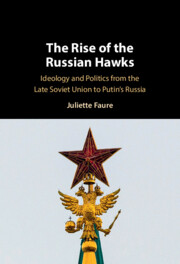Refine search
Actions for selected content:
3 results

The Rise of the Russian Hawks
- Ideology and Politics from the Late Soviet Union to Putin's Russia
-
- Published online:
- 11 June 2025
- Print publication:
- 29 May 2025
1 - Introduction
-
- Book:
- The Rise of the Russian Hawks
- Published online:
- 11 June 2025
- Print publication:
- 29 May 2025, pp 1-27
-
- Chapter
-
- You have access
- HTML
- Export citation
9 - Conclusion
-
- Book:
- The Rise of the Russian Hawks
- Published online:
- 11 June 2025
- Print publication:
- 29 May 2025, pp 291-299
-
- Chapter
- Export citation
